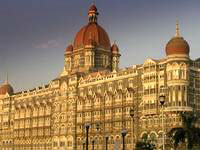 Mumbai OverviewSituated on a peninsula halfway up the west coast of India,
Mumbai (formerly Bombay) is India's economic powerhouse, and home
to more millionaires than any other city on the Indian
subcontinent. As well as being the country's financial capital,
Mumbai is also an important port, handling a third of all
international trade; and a base for many of India's largest
companies. However, among all this wealth and the Bollywood
lifestyle are cases of extreme poverty - with almost half of the 21
million-strong population living in slums. The Portuguese established this old Hindu city as a colony in
1509. In 1661, it passed to England as part of the dowry of
Catherine of Braganza when she married Charles II, and became a
vital trading base for the East India Company and later the Crown.
The centre of Imperial Bombay, the city contains a breathtaking
array of High Victorian buildings and is reminiscent of a
prosperous 19th-century English industrial city. The fascinating
range of architectural styles reflects the British passion for the
Gothic and demonstrates the wealth, panache and confidence of
British Bombay. Prosperity has always been considered more
important than religious homogeneity in Mumbai, and this is
reflected in the range of places of worship throughout the city -
churches and cathedrals sit alongside countless mosques, Hindu and
Buddhist temples. Like many Indian cities, the streets of Mumbai are congested
with cattle, carts and motor vehicles, and the air is thick with
smog and the sound of horns. But despite this, the city has much to
offer, and those en route to Goa should take time to discover
Mumbai's colourful and fascinating history, as well as its vibrant,
energetic and friendly people. At the very worst, your experience
of Mumbai will make Goa's beaches seem that much more peaceful. |